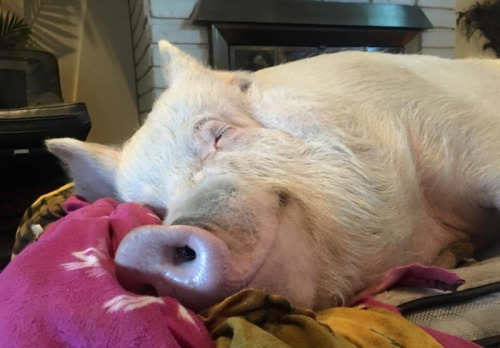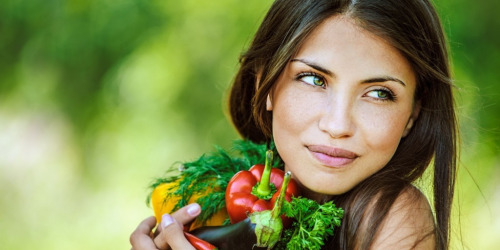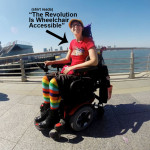|
Author’s Note: While I am still vegan, it’s been over a year that my primary focus (for many reasons) as an activist is no longer animal rights/liberation. As a disabled person, I remain intersectional in my support, but my focus is now disability rights. Since this change, I have heard of many instances of disabled people who experienced ableism from the AR community. While this was certainly not news to me, as I too have experienced this, I want to address the following question from the disabled vegan perspective: is veganism ableist? |
By Michele Kaplan
Every time I delve deeper into the disabled twitter-sphere, without fail I come across tweets from the disability community talking about how ableist vegans are. Vegans calling a disabled person a liar when they state that they can not be vegan due to their disability. Vegans telling disabled folk that if they just ate a healthy whole food vegan diet, they would be “cured”. As if said vegans were actual doctors that specialized in that specific disability, and thus were properly educated regarding any possible treatment options (including medications). As if one size fits all and the vegan diet was a solution for every medical situation. As if by default, disability made a person “broken” and in need of fixing / being cured.
And as a disabled vegan, I often find myself between these two worlds. I cringe and facepalm when I read these tweets, as I try to do damage control: ‘Hey. I’m a disabled vegan and I just wanted to say that I am really sorry you experienced ableism from the vegan community. That is not cool’, in hopes of creating some sense of healing.
So, is ableism a problem within the vegan community? Absolutely. There are intersectional animal rights activists who have solidarity and who get it, but there are also activists who identify as intersectional, but miss the mark on ableism. There are also single issue animal rights activists who don’t even know the word ableism or who do, but don’t care because (to them) the only cause that matters is animal rights, which is just as problematic as it sounds.
Anyone who is involved in activism knows that single issue and faux intersectional activism, by default is indisputably problematic. However, it is only fair to note that Ableism is certainly not just an “animal rights thing”, since Ableism occurs in any cause where the activism is based on an able bodied model and/or the cause fails to acknowledge the existence of disability.
So, is veganism ableist? This is why I say no. Veganism at it’s root is a philosophy, an idea that the animals don’t exist for us. Just as a disabled person, I don’t exist to be someone’s inspiration nor target of pity, animals do not exist to be our meals and clothing. They have their own lives and exist for themselves. This may not be the mainstream way of thinking, but as with all forms of oppression, just because someone decided that a particular demographic is inferior, doesn’t make it true nor does it justify the oppression.
It’s complicated because often vegans will come across people who say “Oh, I could never go vegan. I love cheese (bacon etc.) too much and I could never give that up.” This of course, is not a factual statement, as it is not oxygen in which their life depends on. So technically they could give it up. They just choose not to, which is different from the disabled person who due to their disability / chronic illness, may not have the choice. There are some vegans who fail to make note of the difference, who are unaware that the difference even exists. It’s as if they hear both answers and their bullshit meter immediately goes off, not realizing that the latter is actually valid.
Some vegans might argue: but what if the disabled person in question, is just using their disability as an excuse to not go vegan? This is incredibly harmful and triggering and so as a disabled vegan, I say: believe them every single damn time. I would rather let that one hypothetical person, that 1 out of 10,000 (assuming they even exist) “off the hook”, then give the remaining 9,999 people yet more crap to deal with. Disabled people often experience social and systemic ableism on a daily basis. The last thing the community needs is further discrimination.
It’s also complicated because there is this idea in the animal rights community, that there is no such thing as a half or partial vegan. You either do it 100% hardcore or you can not claim the label. And if you can’t call yourself vegan, then you are deemed as an unethical and a lousy human being. This in itself is ableist because if a person is legitimately not able to go the 100%, then they shouldn’t be shamed for that.
It’s also complicated because in truth, no one is 100% vegan. When I go to the market to get vegan food, I go to a market that has a whole section dedicated to meat, eggs and dairy. Therefore, I am essentially, though indirectly, financially supporting a business that profits from the animal agriculture industry. When I use a grocery delivery service (as due to my disability, I can not always make it to the store), they bag the groceries in plastic bags which (and I kid you not) contain additives that are derived from animals. My point being, that the system in it’s current state, makes it impossible to do zero harm and thus there is no such thing as the perfect vegan.
Veganism is thus about doing the least harm and the most good. And so if one can not go fully vegan due to their health and/or disability, it becomes a matter of doing what they can. Consider eating less meat. Not an option? Considering drinking a non-dairy “milk” (soy, rice, almond, oats, coconut etc.) instead of buying dairy milk. Or if changing ones diet is not an option, then consider purchasing products for your home and body that are not tested on animals, if not totally vegan. One can choose to buy clothing made from synthetic material instead of animal skins such as leather, fur and suede. If you already own a leather coat, as an example, and can not afford to buy a new synthetic one, then wear the coat but do less harm in other ways. My point being, it’s about doing what you can. It doesn’t matter if this doesn’t “qualify” you to accurately identify as vegan. It’s better to do some good and less harm than nothing at all.
And do keep in mind that this goes beyond the animals. There are mainstream scientific studies that show that the animal agriculture industry is one of the largest contributors to climate change. This is big, considering since climate change is an issue that directly impacts us all, but particularly people who are poor and/or the disabled population. After all, who is often left stranded during and after a major storm (such as a hurricane)?
Or even just the impact of climate change on every day weather. Climate change is being linked to the increase in heat advisories which prevent people (like myself) who are medically sensitive to the heat, from leaving their home. I am vegan for many reasons, but one of them being is that I do not do well with being stuck in my apartment for a week. When I do my best to not support the animal agriculture industry, I lessen climate change, and thus I lessen the physical isolation that I experience, which impacts my well being.
That being said, the intention of this article, is not trying to tell people what to do nor demand change. I just wanted to address the question of “is veganism ableist?” as a disabled vegan and present you with the information from that perspective. Because in the end, it is never … ever okay when a vegan (or anyone) is ableist (or any other form of discrimination), but that doesn’t make veganism (or a variation of), a bad idea.
This essay originally appeared on Rebelwheels’ Soapbox on September 6, 2016.





